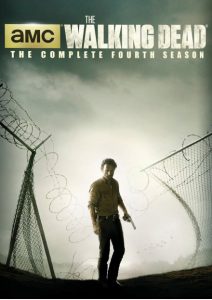With Rick lying on a sofa without moving, Carl puking up his breakfast and bizarre dream sequences popping up (albeit from Michonne, not Carl), Sunday’s mid-fourth-season premiere of AMC’s “The Walking Dead” obviously called to mind the “Buffy” episode “The Body.” It’s a credit to the show’s unpredictability that I thought they might kill off the main character, and a credit to its structure that it didn’t seem too hoary when Rick turns out to be alive.
The hour had very little dialogue as it embarked on what seems to be the new format coming out of the big prison battle in December: Focusing on individuals or small groups adrift in the Georgia backwoods. This first episode zeroes in on Michonne in one subplot and Carl in the other. In a case of sharp writing, the scene of Michonne dreaming about her child and husband – both presumably deceased now – made me wonder if some of the Carl stuff could also be a dream, which added another layer to the mystery of whether Rick was dead or just in a deep recuperative slumber.
My mind drew parallels between Buffy’s numb, disconnected reactions (thinking it was important to adjust her mom’s skirt, puking on the rug, calmly calling Giles, politely thanking the EMTs) and Carl’s. He draws a pair of walkers into a neighboring yard and almost gets killed, then explores the house – nominally to stock up on food – but almost gets killed by another walker, then eats 120 ounces of pudding on the roof rather than bringing the food back to the secured house with his dad.
And just as “The Body” ends with the dead rising (a vampire in the morgue, not Buffy’s mom – although the next episode riffed on the latter concept), I thought “After” might end with Rick turning into a zombie and Carl having to kill him. As it turned out, “The Walking Dead” didn’t go quite that far, and instead of one of the grimmest imaginable endings to an episode, we got one of the series’ happiest endings when Michonne reunites with Rick and Carl. (They should’ve shown the actual hugging though.)
And we also learn something important about Carl. Even though Rick says “You’re a man now,” the episode reveals that he’s very much a kid: He has a trial run at going it alone with his dad “dead” on the couch, and he reverts to impulsive childlike decisions. (Buffy does, too, in “The Body,” if only in the sense that she needs her friends and Giles during the time after her mother’s death, and Dawn is even more immature in the following episode when she tries to resurrect Joyce.) Carl is unable to kill “walker” Rick and is willing to die for that failure. (On another note, of course, it’s a blessing that he is unable to pull the trigger, because Rick was still alive. Very stupid on his part to wake up moaning like a walker, by the way.)

The brilliance of “The Walking Dead” is that it can be many things: Big questions like the radio transmission give it a “Lost”-like watercooler aspect, and it can do both big action episodes and intimate character pieces. While the December finale (“Too Far Gone”) where the Governor wages war on the prison was hyped up, I actually preferred an episode earlier in the fall (“Live Bait”) where the Governor toys with re-inventing himself as a good person named Brian. Regrettably, the writers chose not to pursue that path for very long, and the Governor reverted to form the moment he golf-clubbed his henchman on top of an RV.
However, the Brian episode seems to be indicative of the thrust of Season 4: The exploration of how a zombie apocalypse can change people, either because the environment forces them to change, or because they see it as an opportunity to be a different person. (And to what degree that change is genuine, and to what degree it is faked.) Sometimes it brings out the worst in a person (the Governor), sometimes the best (Daryl), and sometimes they move into a moral gray area (Carol).
Next week, it seems we’ll catch up with Tyreese, Beth, Maggie and Glenn and find out what shapes this latest fire forges them into.

